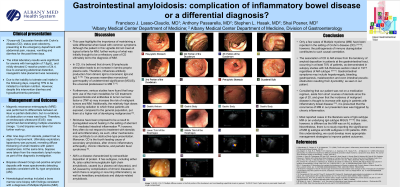Tuesday Poster Session
Category: IBD
P4441 - Gastrointestinal Amyloidosis: Complication of Inflammatory Bowel Disease or a Differential Diagnosis?
Tuesday, October 29, 2024
10:30 AM - 4:00 PM ET
Location: Exhibit Hall E

Has Audio

Francisco J. Lasso, MD
Albany Medical Center
Albany, NY
Presenting Author(s)
Francisco J. Lasso, MD, Anthony Passarella, MD
Albany Medical Center, Albany, NY
Introduction: In this report, we describe a case of a 70-year-old patient with a past medical history remarkable for Crohn's disease (CD) presenting with abdominal pain, nausea, diarrhea and vomiting who was initially treated as refractory Crohns (rCD). However a subsequent biopsy showed this was in the setting of secondary amyloid in the setting of newly diagnosed Multiple Myeloma (MM).
Case Description/Methods: Patient presented with 1 year of progressively worsening symptoms that in the last month, became significantly worse. Upon admission, imaging revealed diffuse enteritis from her duodenum to her ileocecal anastomosis. Given new inflammation seen, she underwent small bowel enteroscopy that revealed duodenitis and biopsies showed clusters of hyalinized vessels with chronic inflammation. Given her history of CD, there was concern of rCD hence was started on IV steroids. After slowly escalating diet, she developed obstipation for which repeat imaging revealed small bowel obstruction, however, exploratory laparotomy that did not show obstruction. General surgery performed lymph node biopsy, which revealed amyloidosis and further workup up identified multiple myeloma.
Discussion: Only a few cases of MM are been reported in the setting of CD, however the pathogenesis of immunodysregulation can contributes to such correlation. This case highlights the importance of maintaining a wide differential when faced with a common presentation. In CD, it’s believed that B lymphocyte chronic stimulation leads to plasma cells and therefore influence antibody production similar to MGUS (monoclonal gammopathy of undetermined significance) the universal predecessor to MM. Meanwhile, rCD is pathologically defined as an inflammatory ileocolonic disease with severe features or bowel obstruction. The latter has been proposed to be due to dysregulated wound healing/inflammation. However, they may often not respond to classical treatment. As such, other mechanisms may be responsible for an obstructive-type picture such was amyloidosis (AM). Our patient presented signs of obstruction, thought to be rCD, however that was not the case. Generally, the average age at which MM occurs reportedly at 66 years; considering that our patient was not on medication and incidence of malignant disease is thought to increase with age, it is presumed that the occurrence of MM in our presented case was triggered by inflammation. Most reported cases in the literature were of Ig subtype; this case, however, is different as it was an AM subtype.
Disclosures:
Francisco J. Lasso, MD, Anthony Passarella, MD. P4441 - Gastrointestinal Amyloidosis: Complication of Inflammatory Bowel Disease or a Differential Diagnosis?, ACG 2024 Annual Scientific Meeting Abstracts. Philadelphia, PA: American College of Gastroenterology.
Albany Medical Center, Albany, NY
Introduction: In this report, we describe a case of a 70-year-old patient with a past medical history remarkable for Crohn's disease (CD) presenting with abdominal pain, nausea, diarrhea and vomiting who was initially treated as refractory Crohns (rCD). However a subsequent biopsy showed this was in the setting of secondary amyloid in the setting of newly diagnosed Multiple Myeloma (MM).
Case Description/Methods: Patient presented with 1 year of progressively worsening symptoms that in the last month, became significantly worse. Upon admission, imaging revealed diffuse enteritis from her duodenum to her ileocecal anastomosis. Given new inflammation seen, she underwent small bowel enteroscopy that revealed duodenitis and biopsies showed clusters of hyalinized vessels with chronic inflammation. Given her history of CD, there was concern of rCD hence was started on IV steroids. After slowly escalating diet, she developed obstipation for which repeat imaging revealed small bowel obstruction, however, exploratory laparotomy that did not show obstruction. General surgery performed lymph node biopsy, which revealed amyloidosis and further workup up identified multiple myeloma.
Discussion: Only a few cases of MM are been reported in the setting of CD, however the pathogenesis of immunodysregulation can contributes to such correlation. This case highlights the importance of maintaining a wide differential when faced with a common presentation. In CD, it’s believed that B lymphocyte chronic stimulation leads to plasma cells and therefore influence antibody production similar to MGUS (monoclonal gammopathy of undetermined significance) the universal predecessor to MM. Meanwhile, rCD is pathologically defined as an inflammatory ileocolonic disease with severe features or bowel obstruction. The latter has been proposed to be due to dysregulated wound healing/inflammation. However, they may often not respond to classical treatment. As such, other mechanisms may be responsible for an obstructive-type picture such was amyloidosis (AM). Our patient presented signs of obstruction, thought to be rCD, however that was not the case. Generally, the average age at which MM occurs reportedly at 66 years; considering that our patient was not on medication and incidence of malignant disease is thought to increase with age, it is presumed that the occurrence of MM in our presented case was triggered by inflammation. Most reported cases in the literature were of Ig subtype; this case, however, is different as it was an AM subtype.
Disclosures:
Francisco Lasso indicated no relevant financial relationships.
Anthony Passarella indicated no relevant financial relationships.
Francisco J. Lasso, MD, Anthony Passarella, MD. P4441 - Gastrointestinal Amyloidosis: Complication of Inflammatory Bowel Disease or a Differential Diagnosis?, ACG 2024 Annual Scientific Meeting Abstracts. Philadelphia, PA: American College of Gastroenterology.
